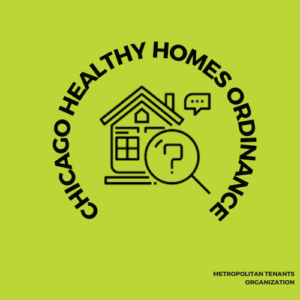
The Chicago Healthy Homes Coalition (CHHC), a coalition of renters and advocates, proposes to create a citywide rental housing registry and a proactive healthy homes inspection program. This is a matter of racial and health equity. No Chicago renter should get sick or die because health hazards, such a lead or a lack of smoke detectors, exist. No renters should have to live with mold, rats, or use their stove for heat. We call upon the city to create a citywide program to hold bad landlords accountable and to ensure that all housing is safe, decent and accessible.
Chicago does not regularly inspect housing for basic safety standards. This means that poor housing conditions can go unaddressed until a tenant makes a report to the city, often after an injury or illness. Proactive inspections will ensure that unsafe housing issues are addressed sooner, fewer people will be harmed or injured, and Chicago’s housing stock will be improved.
History + Background
A little over half of all Chicagoans are renters. The city is also home to higher-than-average rates of water leaks, heating and plumbing equipment breakdown, problems with broken plaster and peeling paint, and sewage disposal issues, according to the National Center for Healthy Housing. In 2019 renters made more than 30,000 complaints for occupied blight and other habitability issues, with most complaints coming from the South and West Side.
Simultaneously, the city does not currently require proactive inspection of rental units. Dangerous conditions are only addressed after a complaint is filed with the City. Minor issues are not addressed and unreported hazards often transition into disasters before a complaint is filed. Complaint-based inspection is additionally inadequate because inspectors often limit the the investigation only to what is reported. Many complaints are also never investigated; inspectors regularly have trouble accessing properties without landlord cooperation. The lack of a rental property registration system exacerbates this problem, as many owners do not have discoverable contact information, particularly when the property is owned by a limited liability company (LLC).
The Consequences
Lead Poisoning: Because over 81% of Chicago’s housing stock was built before the federal government banned lead-based paint in 1978, most of these buildings, many of which have not been appropriately maintained, repaired, or renovated, likely contain lead-based paint. Lead is a major neurotoxin that causes lifelong learning disabilities, hearing loss, speech delays, intellectual disability, ADHD, and aggressive/violent behaviors, even at relatively low levels. In many community areas, the childhood lead poisoning rates are more than double or quadruple the city-wide rate: from 4.4 and 5.7 per 100 children in Austin and West Garfield Park, and as high as 7.2 and 7.3 per 100 children in Englewood and West Englewood.
Asthma: Researchers have found excess moisture allows for the breeding of mold, mildew, mites, and cockroaches, and that cracks allow pests like rodents and bugs to enter the home, all of which have been linked to greater asthma morbidity and mortality. In Chicago, Black children have twice the prevalence of asthma when compared to White and Hispanic children.
Societal, Economic, and Educational Harms: Other poor housing conditions, such as presence of rats and cockroaches, missing or malfunctioning necessities (e.g., toilet, stove, windows), and other structural, electrical, and plumbing issues have been connected to higher school absenteeism, reduced performance on standardized tests, and cognitive deficiencies in students.
Fires and Fatalities: Between 2014 and 2019, 140 fires killed 92 Chicagoans. Nearly half of those fires involved buildings without a working smoke detector. A Chicago Tribune / Better Government Association investigation into fires in the same timeframe found more than two dozen cases in which safety conditions played a role in the fires, but records showed the buildings had not been inspected for five or more years.
Public Fiscal Costs: Chicago’s inability to address dangerous housing conditions is expensive to the public. Very conservatively estimating that just one-half of Chicago’s 1,376 lead-poisoned children in 2017 required special education, Chicago therefore spent roughly $7.5 million to $15 million per year in additional instructional costs for those students alone. Other studies corroborate that every dollar spent to prevent lead poisoning saves hundreds of dollars in the form of greater earnings and reduced taxpayer-funded health care, special education, and law enforcement costs.
In 2018, Chicago’s Office of Inspector General found that our current complaint-based system permitted safety and health hazards to go unaddressed for longer than the law allowed. A follow up report in 2019 gave the City recommendations to improve inspections.
Our Solution
CHHC is proposing a three-year pilot to begin the transition from Chicago’s ineffective and dangerous complaint-driven inspection system to a proven proactive rental inspection and rental registry program.
The pilot includes three major components:
(1) healthy homes inspection of all residential rental properties in two select community areas;
(2) a citywide residential rental registry
(3) community outreach to educate and engage tenants, landlords, and other stakeholders.
The program is designed to be budget neutral, as it will be funded by registration fees paid by landlords. It will be implemented by a project manager hired by the city, in collaboration with the Departments of Housing, Buildings, and Health.
Healthy Homes Inspections. The City will develop a healthy homes inspection program to be used citywide and pilot the program in two community areas—one high-need and one mixed-need. The pilot’s healthy homes inspections will incorporate nationally-recognized principles of healthy homes, including that they be dry, clean, safe, contaminant-free, well-ventilated, thermally controlled, well maintained, and accessible.
Rental Registry. As part of the pilot, the City of Chicago will establish a citywide residential rental registry, to be managed by the Department of Housing. All landlords will be required to register their rental properties with the City annually, paying a registration fee and providing some basic information about the property.
Repair Grants for Small Landlords. The rental registry fees would go into a fund that prioritizes grants for small landlords who own 6 or fewer units to make necessary repairs. This will encourage landlords to participate in the program.
Community Outreach. Because community buy-in and support is critical to the success of the pilot, the City will involve key stakeholders in the community at all stages of pilot development and implementation by creating a community advisory board to assist with oversight and evaluation at the end of the pilot. The City will also hire inspectors and other City personnel from pilot communities, which will help to ensure that the pilot is implemented equitably and with the needs of the community in mind.
9 Potential Solutions to Keep Chicagoans Safer From Fires. Better Government Association
Evaluation
To evaluate the pilot project, the City will hire an independent professional who is a healthy housing expert. This individual will design and implement a robust evaluation, collecting and analyzing both qualitative and quantitative measures.
Quantitative Measures: Identified hazards; hazards remediated; cost to the City; cost to landlords; training needs; number of inspections/inspectors; frequency of inspector success in property entry; estimated fiscal benefits for the public; financial and health benefits for impacted households.
Qualitative Measures: Qualitative measures will include open-ended interviews with inspectors, community stakeholders, advocates, landlords, and tenants about their experiences during the pilot.
The evaluation will also use the inspection data to identify common housing hazards that are not considered violations under Chicago’s Building Code and make recommendations for possible amendments. The evaluator will additionally ascertain compliance with the rental registry requirements, to inform potential incentives and penalties to ensure compliance.
**Read our full white-paper here.**
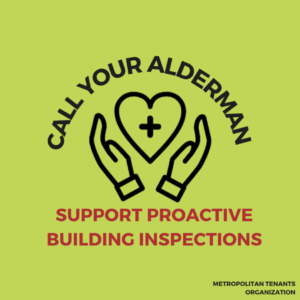
Take Action!
We need City Council to implement this project. Call your Alderman today and demand they support Chicago Healthy Homes!
Join the Coalition! Sign up to be a sponsor.



 Only A Judge Can Evict You
Only A Judge Can Evict You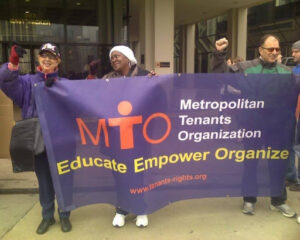 HUD tenants recently had concerns about bed bugs, issues with re-certification, retaliation by management, and the use of their community room in their building. Management at first did nothing to resolve the complaints. Tenants called MTO and building organizer David Wilson went to the building and informed them of their rights. Tenants in the Park Shore East building located at 6250 S. Harper then formed an association.
HUD tenants recently had concerns about bed bugs, issues with re-certification, retaliation by management, and the use of their community room in their building. Management at first did nothing to resolve the complaints. Tenants called MTO and building organizer David Wilson went to the building and informed them of their rights. Tenants in the Park Shore East building located at 6250 S. Harper then formed an association.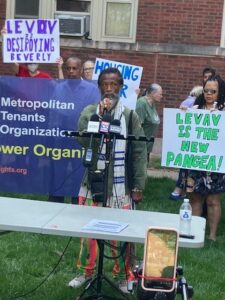
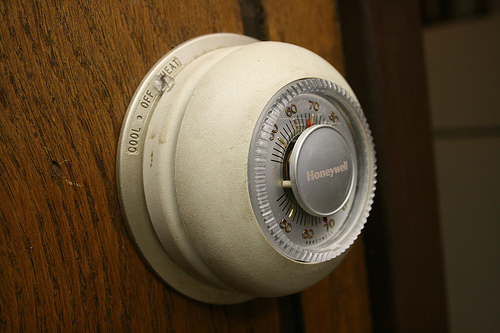


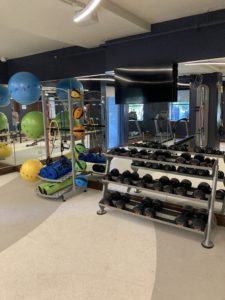 Mr. Green and the other tenants testified every year at
Mr. Green and the other tenants testified every year at 

